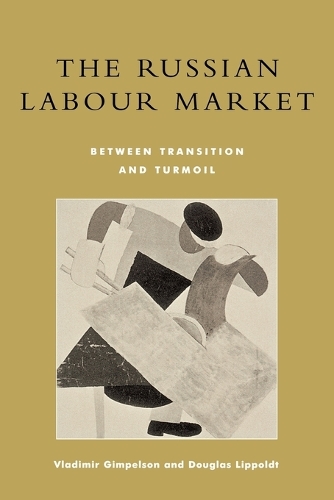
The Russian Labour Market: Between Transition and Turmoil
(Paperback)
Publishing Details
The Russian Labour Market: Between Transition and Turmoil
By (Author) Vladimir Gimpelson
By (author) Douglas Lippoldt
Bloomsbury Publishing PLC
Rowman & Littlefield Publishers
7th February 2001
United States
Classifications
General
Non Fiction
Labour / income economics
Sociology: work and labour
Politics and government
331.120947
Physical Properties
Paperback
304
Width 148mm, Height 228mm, Spine 13mm
331g
Description
Labour markets are a central element of any transition from planned economy to market-oriented system. This groundbreaking book examines the plight of Russian workers and employers during the first decade of post-Soviet reforms. The authors argue that higher-than-expected labour market flexibility early in the transition provided an important cushion for workers who would have been displaced with little recourse to social protection. However, over time, this flexibility reduced pressure for enterprise restructuring and accommodated policy drift. Although many workers were quite mobile, often this translated into a loss of human capital for older enterprises - even potentially viable ones - and to "churning" in the labour market, accompanied by only limited restructuring. There was little job creation, labour hoarding persisted, and many workers saw their wages eroded by inflation and late payment of wages. The authors show this situation was largely the result of insufficient structural reforms, poor institutional development and misplaced incentives. First providing an overview of the economic siutation, key labour market trends, and the institutional situation during the 1990s, the book then reviews labour market dynamics. The authors assess changes in "old" jobs at former state enterprises and evaluate "new" job creation, mostly in private businesses. They examine the evolution of wages and the availability of societal protection to workers. A special thematic section considers the political economy of labour market policy that brought the "Russian approach" to labour market adjustment to life. The conclusion presents an integrated picture of the Russian labour market in the aftermath of the early transition period and highlights the implications of the experience for current policy.
Reviews
This is a fresh and penetrating analysis of Russian labour market developments, which are critical for Russia's economic transition. It is a superb resource for students of the transition. Readable, detailed and well-documented, this book links the workings of the labour market to the larger picture of economic, political and social change. -- Richard Layard, London School of Economics
This book combines first-hand study of the transition in Russia and careful analytical work. The authors' integrated, multidisciplinary approach helps to expose the underlying institutional environment as well as the social and political factors that have influenced economic outcomes. -- Jnos Kornai, Harvard University and Collegium Budapest
A must read for those interested in doing research on the Russian labour markettttt * The Economics Of Transition *
This well-argued and clearly written book serves both as an important work of reference and more generally as a solid contribution to the field of post-Soviet economic reform. The treatment is meticulous and supported by the judicious application of casestudies . . . and relevant statistical data.... * Slavic Review *
This book is a must read for those interested in doing research on the Russion labour market. It provides the correct conceptual framework; it identifies interesting empirical labour market outcomes and provides us with a plausible set of institutional, social and political explanations. An excellent starting point. * The Economics Of Transition *
This remarkable study captures the essence of Russian economic transition as seen from the cross-cutting perspective of the labour market. Gimpleson and Lippoldt's well-balanced account highlights key obstacles that have impeded positive change, but also the real progress that is sometimes overlooked. Their insightful and coherent view of the labour market, backed up by a wide range of empiricle evidence, will serve as an invaluable reference to all those working to understand and advance reform in Russia. -- Yegor Gaidar, former prime minister of the Russian Federation
A must read for those interested in doing research on the Russian labour market * The Economics Of Transition *
This well-argued and clearly written book serves both as an important work of reference and more generally as a solid contribution to the field of post-Soviet economic reform. The treatment is meticulous and supported by the judicious
application of case studies . . . and relevant statistical data.
Anyone needing an English-language source on developments in the Russian labour market in 1992-1998 will find this book of great value. It not only provides data and comprehensive economic analyses, but also devotes a chapter to the politics of labour market adjustment Russian style, and considers some questions of public administration. Furthermore, considering the complex material it deals with, it is quite short and also easy to read. * International Review Of Social History *
[This] book should provide an essential reading for anybody interested in understanding the nature of labour and employment restructuring in the early period of transition, and for grasping the direction of the present-day and impending trends. A welcome addition. * Relations Industrielles/Industrial Relations *
Author Bio
Vladimir Gimpelson is a senior research associate at the Institute of World Economy and International Relations (IMEMO), Russian Academy of Sciences.
Douglas Lippoldt is an international economist with the Organisation for Economic Co-operation and Development.
